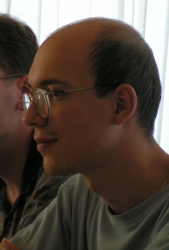Andrei Cusco
project manager
 The academic interests of Dr. Andrei Cusco, the Project Manager, are directly linked to the project’s chosen subject. For a number of years, he has been working on issues related to the comparative history of modern Eurasian empires, Bessarabia’s symbolic geography, the competing Russian and Romanian visions of this contested region in the second half of the 19th and early 20th century, as well as on broader issues of Russian and Romanian intellectual history. In 2008, Dr. Cusco defended his Ph.D. dissertation (Between Nation and Empire: Russian and Romanian Competing Visions of Bessarabia in the Second Half of the 19th and Early 20th Century) at the History Department of the Central European University, under the supervision of Prof. Alfred J. Rieber. During his work on the dissertation, the applicant has closely worked with Prof. Constantin Iordachi and Prof. Alexei Miller, both of whom gave valuable advice on the progress of the research and shared their expertise on the Russian and Romanian state-building projects that framed and circumscribed the Bessarabian case.
The academic interests of Dr. Andrei Cusco, the Project Manager, are directly linked to the project’s chosen subject. For a number of years, he has been working on issues related to the comparative history of modern Eurasian empires, Bessarabia’s symbolic geography, the competing Russian and Romanian visions of this contested region in the second half of the 19th and early 20th century, as well as on broader issues of Russian and Romanian intellectual history. In 2008, Dr. Cusco defended his Ph.D. dissertation (Between Nation and Empire: Russian and Romanian Competing Visions of Bessarabia in the Second Half of the 19th and Early 20th Century) at the History Department of the Central European University, under the supervision of Prof. Alfred J. Rieber. During his work on the dissertation, the applicant has closely worked with Prof. Constantin Iordachi and Prof. Alexei Miller, both of whom gave valuable advice on the progress of the research and shared their expertise on the Russian and Romanian state-building projects that framed and circumscribed the Bessarabian case.
After that moment, Dr. Cusco has been involved in a number of projects that focused, inter alia, on a comparison of the Russian and Romanian ‘visions of space’ (Metageography and the Construction of Space in the Late 19th and Early 20th Century: A Comparative Study of the Russian and Romanian Cases, a project funded by the Gerda Henkel Foundation for the period September 2009- August 2011) and on the interaction between diplomacy and historical discourse in the Romanian case (The Interaction between Historical Discourse and Romanian Diplomacy in Transylvania and Bessarabia (1878-1947), coordinated by Dr. Flavius Solomon, “A. D. Xenopol” Institute of History, Iasi, Romania and funded by the Romanian National Research Council – CNCS). Dr. Cusco has also been involved in an institutional project applying the Begriffsgeschichte approach to Bessarabian / Moldovan history, coordinated by the University of Leipzig and the Moldova State University, that should result in a lexicon of social and political concepts viewing the region’s history from a diachronic perspective (Nation, Identity, Rechtsstaat in the Republic of Moldova: Historical and Social-Political Concepts (A Lexicon). Since 2011, Dr. Cusco has been Director of the Center for Empire Studies at the Department of History and Philosophy within Moldova State University.
Dr. Cusco’s other major publications include: 1) a book on the history of Bessarabia as a borderland of the Russian Empire (Бессарабия в составе Российской империи (1812—1917) [Bessarabia as a Part of the Russian Empire, 1812-1917]), published, in Russian, at the Novoe Literaturnoe Obozrenie Press (Moscow) in March 2012, co-authored with Victor Taki. This book is an attempt at a critical reassessment and revision of the traditional historical narratives of Bessarabian history. In their work, the authors take into account the most recent tendencies and approaches in the field of empire and nationalism studies; 2) an article on the ‘construction of the Bessarabian province’ focusing on the role of cultural, administrative and institutional transfers in this process (which appeared in a collective volume that included the proceedings of an international conference hosted by the German Historical Institute in Moscow in September 2008); 3) an article on the integration of the Bessarabian nobility into the Russian imperial system, published in the European Review of History (ERH), Nr.1, 2009; 4) and a piece discussing the ideology and nationalist vision of Constantin Stere, one of the most prominent Bessarabian-born émigrés to the Romanian Kingdom, in the context of World War I foreign policy debates in Romania. This article is forthcoming in the next issue (Nr. 1, 2012) of the Jahrbücher für Geschichte Osteuropas. Please refer to the attached list of publications for the relevant details.
Another long-term engagement thematically related to the current proposal involved the applicant’s participation (as a team member) in the CNCS-funded project Historical Discourse and Diplomacy: The Transylvanian and Bessarabian Romanians within Romania’s Foreign Policy (1878-1947).
Dr. Cusco has also been involved in several small-scale projects and participated at a number of international conferences in Romania, Russia and Germany. The proposed project thus closely fits Dr. Cusco’s long-term research interests and continues his enduring academic preoccupation for the articulation of mutual visions of ‘otherness’ in Eastern Europe.
Curriculum Vitae : CV Andrei Cusco
One comment-
Pingback: NISE | National movements and Intermediary Structures in Europe | New members